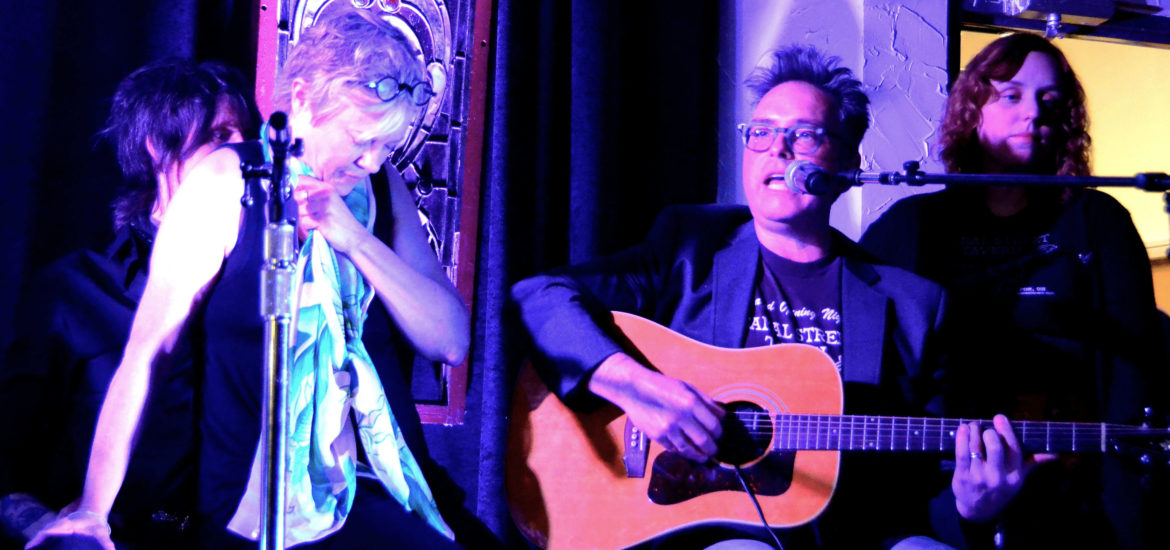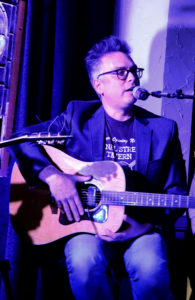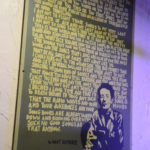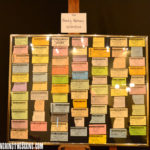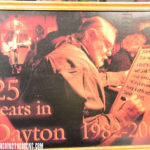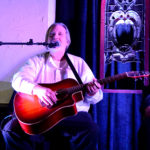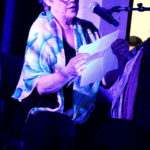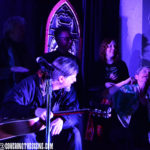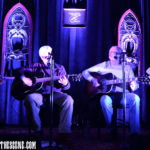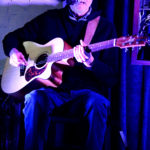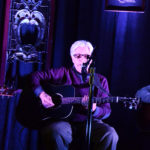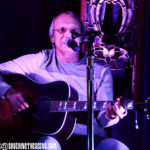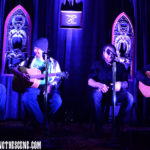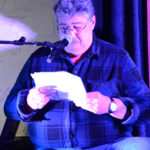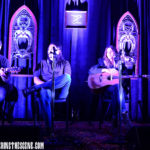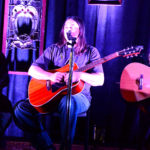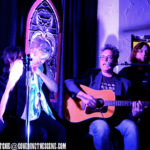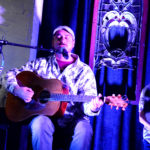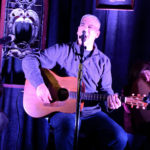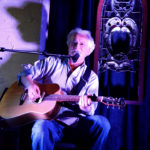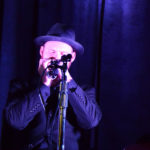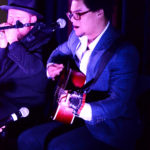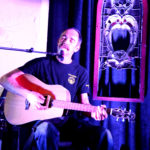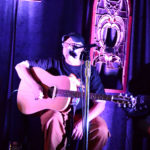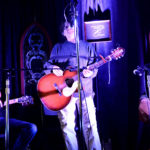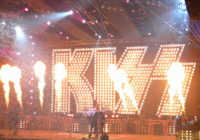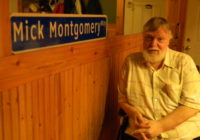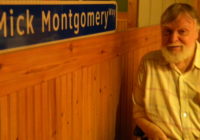Saturday January 20, The Brightside Event and Music Venue was filled with people from all over the area paying tribute to the memory of Wright State Graduate, artist and Canal Street Tavern owner Mick Montgomery. A pillar of the community since the early ‘80s, Montgomery opened the Tavern doors in 1981 giving anyone and everyone a chance to play the stage. From veterans to beginners. Many locals honed their craft there, working out kinks, stage fright, and trying new material, making themselves better performers and songwriters.
There was a buffet, and displays of Canal Street memorabilia along with Brady Karnes’s collection of Canal Street ticket stubs and a podcast where people could share everything Montgomery.
“I talked to Mick around Thanksgiving. He was talking about how some former Canal Street employees came over for an informal dinner party. He talked about how far out it was to see all these people in one room. Then he said something that keeps popping in my head during all this grief.”
“It wasn’t until I retired and you guys started to call, check in on me, and pop by the house, that I realized how many kids I really raised.”
“It’s true, there’s an unbelievable number of people in this town that would not be who they are today without Mick (directly, indirectly or tangentially). He was our father by music and our chosen family. I‘m so thankful we got to spend time with him and be part of the CST family. I truly appreciate Hannah, Chris and Eli putting up with all of us over the years.” -Sarah Muench
Memories, stories and emotion flowed throughout the evening as musicians, fans and friends sat on stage reminiscing about how they met Montgomery or funny things that happened on stage. Whether you knew him in the ‘60s, worked for him or played under his roof, Montgomery always put music over money giving artists a shot when other venues wouldn’t.
The night featured over 50 presenters who played and payed respects in a mix of song, stories and poetry. While acoustic guitars reigned, a little bit of smooth bass slipped in along with one huge electric piano. The evening went from 6 p.m. to past midnight as groups of four spent their five minutes playing and making the crowd laugh, clap, cry and smile.
The night was streamed online for those unable to attend with the trademark stain glass windows and Canal Street sign hung above. For one special night, the heart and soul of Canal Street returned as the filled space became a ‘listening room’ as people told and played their stories. Emotions ran deep with many voices cracking and tears shed. It was therapy as much as happy reminiscent memories for one and all.
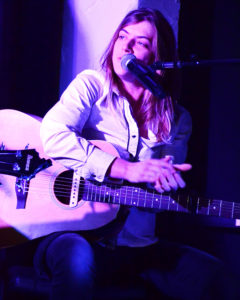 The crowd sat silent, respectfully listening to every word and note shared in homage to how Montgomery ran his venue.
The crowd sat silent, respectfully listening to every word and note shared in homage to how Montgomery ran his venue.
“I wanted to express my gratitude and love to everyone for such a magical, special evening. My children and I felt so much love and appreciation for Mick and what he believed in. The hootenanny was a tribute that we will remember forever and hold close to our hearts.” -Karen Montgomery
Some presenters told deep emotional, personal life-changing and life-saving stories while others played originals and covers of their favorite Canal Street tunes or one Montgomery liked the best. It was said by many that Montgomery always valued music and art over money. Dedicating his life to it, helping sculpt and mold young, raw talent into seasoned, confident performers and musicians. He gave so much, creating decades of memories with the Canal Street Family. He kept the Dayton music machine and scene pumping helping many bands and genres. Musicians figured out how to be musicians, one guest said.
Other’s told stories of song tangles, butterflies, anxiety, nerves, sweat and tears but if you had the desire to perform, Montgomery had a stage for you. Some presenters knew Montgomery in the ‘60s as one speaker told a story of getting arrested with Mick in the Haight-Ashbury district in San Francisco. Other stories included Montgomery’s group Sin City and Tonto’s Headband.
There were several sing along’s as one tune got a clap along beat. Montgomery’s family told stories of growing up in the club and the night they ‘had’ to get stamped.
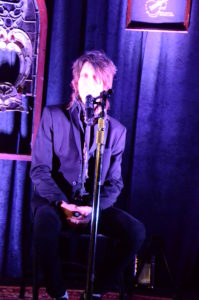 “I hung out at Canal Street during its first few years. I was married to a musician [that didn’t] end well. I thought that’s it, I’m done with this bullshit scene. I’m going to go meet a guy that’s not even remotely related to any of this.”
“I hung out at Canal Street during its first few years. I was married to a musician [that didn’t] end well. I thought that’s it, I’m done with this bullshit scene. I’m going to go meet a guy that’s not even remotely related to any of this.”
“I did and we’re still together 26 years later. He’s my rock. Back then, I just left. It was 1992 and I was sick of [how] women of my generation were being treated. Then I saw Kim and Kelley Deal [The Breeders] breaking all the rules. It was like shit! I could have been doing that, too.”
“I’d met Mr. Right and told Mick I was going home, having a baby, and a real life. As soon as she was independent enough for me to leave the house I was back and said, “Mick, I’m back. It’s full circle for me, and he goes, “Kid, there ain’t one circle. You got a lot of circles left.” Mick, thank you for that, I felt you had to commit to only one thing.”
“Mick went on,“You can be a mom and still do music.” I so appreciated him saying ,don’t buy that bullshit. I appreciate all the wisdom he spoke, to so many younger people and women. In Mick’s economy everyone was A-OK.” (Given at the Yellow Cab Tavern January 6, 2018) -Shelly Hulce
Montgomery was described by several, as the cool dad and many people’s second dad. A well-known and experienced story of him complaining about people talking during performances, when bands were waiting to get paid at 3 a.m. was shared with a grin. The crowd also got some entertaining comedy during a magical baseball protest song.
“I remember one of the last days of Canal Street. A couple of Micks friends tried to get in for free. Mick looked them in the eye, pointed at the stage and said, “I can’t let ya in for free because it’s taking money out of the bands pockets.” That’s one of the things I miss, he was serious and could separate business from friendship.” “Mick made sure [besides official guest list] people didn’t get in free, that was unique. He really cared about paying musicians. That’s part of the Canal Street tradition.”
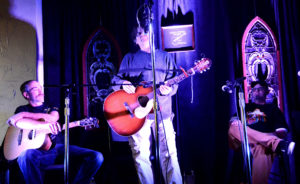 “Mick influenced me by teaching me not to worry about what people say and think and focus on getting people to show’s and work with bands that will work with me. He treated Canal Street as a business, paying bands as much as he could [explaining the paperwork]. It was the only place in Dayton, where bands signed for their money. Canal Street had a built-in crowd for people who liked great music. Mick said, if you could pack Canal Street, you’re legit. It was about the music 100 percent and the people on stage. They were genuinely a music crowd supporting the bands. If you got people out, you were going somewhere and that’s what made it special.”
“Mick influenced me by teaching me not to worry about what people say and think and focus on getting people to show’s and work with bands that will work with me. He treated Canal Street as a business, paying bands as much as he could [explaining the paperwork]. It was the only place in Dayton, where bands signed for their money. Canal Street had a built-in crowd for people who liked great music. Mick said, if you could pack Canal Street, you’re legit. It was about the music 100 percent and the people on stage. They were genuinely a music crowd supporting the bands. If you got people out, you were going somewhere and that’s what made it special.”
“He was completely open to any kind of music as long as you had the will power to go out and make it happen. Mick was honest with bands, that really inspired me. Canal Street was adamant about acoustic performances. That was unique. If you’re in Dayton and an acoustic player, Canal Street was the place to perform.”
“He gave me the Canal Street stamper as a gift on the last night. [It] was used on the first night and the last night. That was a very precious gift and I’ll always remember that. I treasure it. Mick was one of my best friends and really cared about the music scene. He booked bands that needed a chance and fought for the underdog. He was the real alternative promoter. You could be anybody as long as you had the will and drive.”
“There were cover bands that never got to perform original music until Canal Street. Mick opened the floodgates to original bands in Dayton before anyone else providing the opportunity. Mick was so open minded with a big heart. He even supported me! It will never be replaced or repeated. Canal Street was a trendsetter.” – Louie Wood Jr.
Sharon Lane was given the stage as she played, for as long as she wanted. With deep rooted, emotional songs while sharing stories about how to get booked on festivals. She said, Montgomery treated locals the same as national acts, giving them validation as writers and artists.
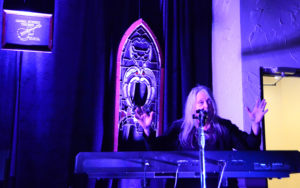 There were so few fights there, when they did happen, it was kinda cool. She shared a not so good story about Leon Redbone coming to town. Another story was told about a random performer that dressed up like a rabbit and did disco songs.
There were so few fights there, when they did happen, it was kinda cool. She shared a not so good story about Leon Redbone coming to town. Another story was told about a random performer that dressed up like a rabbit and did disco songs.
“Mick left a tremendous legacy for all of us to enjoy. It will be up to all of us to use that legacy for the best. I am so happy that the storytelling event happened the week before. Talk about being guided by the forces. I will forever be honored to have been a small part of Mick’s dream.” -Sharon A. Lane
Canal Street hosted Steve Goodman’s last show in ’84. Stories of church pews and drum sets for kids were shared. Another speaker talked about seeing Bob Dylan in ’63, closing with a poem and Mick’s love of poetry. Mick’s rule that bands could play anywhere except the week they’re playing there was refreshed.
Language wasn’t a barrier as Montgomery gave singers the chance to sing in their first or second language with a song performed in Spanish. Montgomery created a family and a tree of life over the years. Another guest played a song from the 25th Anniversary Hootenanny with colorful stories of Montgomery’s challenges behind the wheel.
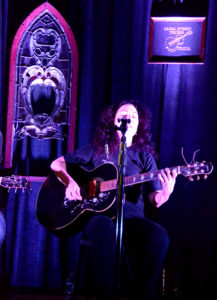 “Canal Street Tavern was so important to the employees and customers [because,] it’s ‘in our bones.’ It’s what Mick invited, encouraged and allowed: Individuality. What you saw last Saturday was a ‘snip-it’ of the diversity that came in the doors for 33 years. The performers on Saturday were local musicians inspired by each other and national acts that offered musical outlets in different forms.”
“Canal Street Tavern was so important to the employees and customers [because,] it’s ‘in our bones.’ It’s what Mick invited, encouraged and allowed: Individuality. What you saw last Saturday was a ‘snip-it’ of the diversity that came in the doors for 33 years. The performers on Saturday were local musicians inspired by each other and national acts that offered musical outlets in different forms.”
“We hear the terms tolerance and acceptance a lot these days. Mick expected it, demonstrating through example, booking acts from all genres, demanding they have equal opportunity to be heard. That’s why he called Canal Street the “Listening Room.”
“The phrase, “When in Rome, do as the Romans do” is one way to explain how people in Dayton learned to appreciate and honor ‘all walks of life.’ How can one NOT grow when enveloped in an environment of tolerance and acceptance? I know from my core, I’m a better, more empathetic person [from] my experiences working and later performing at Canal Street. I owe it all to Mick’a dream to honor and encourage individuality.”
“I started in 1988 as a waitress at 19, attending Wright State University. I felt part of a ‘family’ immediately, realizing I was part of something ‘big’ but couldn’t define it until years later. Mick became one of my closest friends. He was my confidante and champion. I miss him terribly.” – Katherine Dougherty-Mullins
The last poem read at Canal Street was shared and another speaker said how much the Storytellers event at Old Yellow Cab meant to Montgomery. The ‘Canal Street All Stars’ came up to help perform a few times during the evening. Canal Street was about music, not who you were. Some guests played Canal Street’s opening night while others played the 20th anniversary.
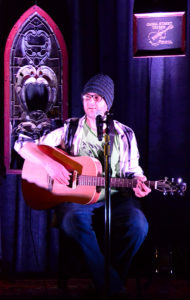 “Mick hired me at 21, in 2000. I had a shaved head and was finding my way through adulthood struggling with depression and anxiety. He believed in me. My work ethic was pride and diligence. He gave me an opportunity to be myself. I saw his vision of a listening room and supported it. He became a mentor and a strong friend. Many years I gave my all, supporting his cause for musicians. I evolved and watched others evolve. He was always supportive and fair.”
“Mick hired me at 21, in 2000. I had a shaved head and was finding my way through adulthood struggling with depression and anxiety. He believed in me. My work ethic was pride and diligence. He gave me an opportunity to be myself. I saw his vision of a listening room and supported it. He became a mentor and a strong friend. Many years I gave my all, supporting his cause for musicians. I evolved and watched others evolve. He was always supportive and fair.”
“I almost passed away a few times during my employment. I grew to understand and manage my depression, with Mick’s support.” [Nishwitz suffered a coma, from food poisoning and was saved by medical staff.] “It was Mick’s voice that pulled me through that very difficult time. A friend called and asked him to speak to me over the phone. I will never forget being in that darkness, and coming out because of Mick’s kind spoken words.”
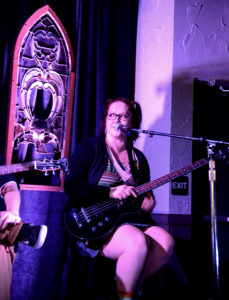 “In 2013, I was part of the change when Canal Street Tavern turned into Canal Public House. It wasn’t easy for any employee. I watched many leave. Mick’s health changed and we were very concerned. If you view the last pictures from the Canal Street employees, you’ll see a smiling lady with her middle finger up. That’s me. It was my emotion being put through the ringer, still supporting the man who wanted Dayton to have a full listening room.”
“In 2013, I was part of the change when Canal Street Tavern turned into Canal Public House. It wasn’t easy for any employee. I watched many leave. Mick’s health changed and we were very concerned. If you view the last pictures from the Canal Street employees, you’ll see a smiling lady with her middle finger up. That’s me. It was my emotion being put through the ringer, still supporting the man who wanted Dayton to have a full listening room.”
“I was the last female employee of Canal Street Tavern. In 2000, I had no idea, I would say that nearly 20 years later. I never saw an end, even on my last shift. I’m incredibly thankful for all the years, memories and lessons learned being part of Mick’s vision. May his love and support live within all of us. May each of you evolve to the greatest part of you, that you can be. Music gives us a voice, and Mick provided us with that opportunity.” -Jessica “JC” Nishwitz from Canal Street Tavern.”
Images by Mike Ritchie

